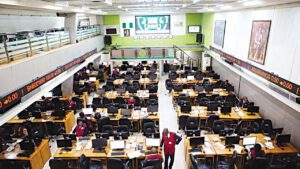
Nigerian stocks drop by 1.63% in September, first time since 2019
The Nigerian All Share Index dropped by 1.63 per cent to close trading at 49,024.16 points on September 30, 2022, first time since 2019.
The equities market has also sustained a bearish profile for four consecutive months since June this year.
The build-up to the 2023 election has kept foreign investors at bay and sell-offs by domestic investors deepen.
Also, the decision of the Central Bank of Nigeria (CBN) to increase the interest rate to 15.5 per cent has also further depressed investors’ appetite for equities to embrace money market instruments.
The ASI rose to as high as 54.085.30 on May 27 2022 but has since in the past four months dropped by 5,061 basis points or 9.55 per cent
Nigerian Exchange, which opened the month at N26.880 trillion in market capitalization and 49.836.51 in the index at the beginning of trading on September 1, 2022, closed on September 30, 2022, at N26.451 trillion and 49,024.16 index points, hence has earned a month to date loss of about N429 billion or 1.63 per cent
Further analysis showed that the NGX Insurance Index got the hardest hit in terms of decline in percentage in September, dropping by 6.45 percent to 168.60 points from 180.23 points it opened for trading during the month.
The Oil & Gas Index followed with a decline of 4.48 percent to 508.26 points from 532.15 points it opened for trading in September.
Pre-election years are usually characterized by negative sentiments, which also result in the exit of foreign investors.
The build-up to the 2023 general election has started impacting the market negatively. Frightened foreign and domestic investors are exiting the market, which is sparking up a liquidity crisis.
Market experts believe that domestic Investors’ sentiment is usually weak as they seek to reduce their market exposure when elections draw closer. The intensity of the impact is usually a function of the degree of political tension and uncertainty generated by political activities.
The Central Bank during its last MPC meeting had increased the interest rate from 11.5 per cent to 14 per cent in the last two meetings, however with the inflation rate still spiking above 20 per cent, the CBN has raised the rate further to 15.5 per cent in a bid to combat the rising cost of goods and services.
According to market operators, when the interest rate is low, speculators move their funds from money market instruments to the stock market for higher yield, just as they move from stocks to other asset classes, especially money market instruments when the interest rate is high.
Analysts at CardinalStone Partners Limited noted that the build-up to the 2023 election will keep foreign investors at bay and throw up more financial account-related concerns.The analysts, while commenting on the state of the nation in their 2022 mid-year outlook themed: ‘Same Challenges, New Shocks’ argued that pre-election year concerns and fears of negative pass-through to inflation will likely limit the magnitude of currency adjustment made at the official market in the current year. According to them, akin to the trend witnessed in emerging and frontier markets, Nigeria was also mostly unappealing to foreign capital providers in H1’22. They attributed the sentiment to geopolitical uncertainties and hawkish rendition from global central banks. In addition to these global factors, they pointed out that lack of market reflective FX rates, illiquidity, and a backlog of uncleared foreign exchange demand dampened investors’ sentiments.
Mr. David Adonri, Executive Vice Chairman, Hicap Securities Limited said, “Right from the penultimate year to the election, the socio-political atmosphere becomes charged. Politicians resort to violent rhetoric and divisive tactics, which deepen the country’s socio-political fault lines, in order to establish a competitive edge. During this period, the economy becomes overloaded with money arising from excessive election spending, which spikes inflation.
“Historical antecedents indicate that on average, both equities and bonds show positive or negative performance in the penultimate year and immediately after the election. While the drama of general elections can make your imagination run wild, what you need to watch out for is how the unfolding scenario will affect the economy, the capital market, and your portfolio.
“It may be helpful to stick to a long-term strategy, which is longer than any election cycle, as returns in the capital market are made over a full business cycle, which may be longer than even one presidential term. For investors with a low-risk tolerance, the safety of bonds can douse their apprehensions.”
Adonri said when interest rate rises, investors tend to migrate to fixed-income securities.
“The hike is capable of migrating financial assets away from equities to fixed income; expect investors to sell down their shares in the near term. Both equities and fixed income operate on yield, with the increase in the interest rate the yield in fixed income will be higher and investors will move there until the price of equities fall to be competitive in the debt market. If macroeconomics improves and inflation starts dropping it will then favour the equity market and we will start seeing stabilization.”
Mr. Victor Chiazor, Head of Research and Investment, FSL Securities Limited said with the increase in interest rate, it is expected that all the stocks will definitely be hit hard.
“Investors just need to be patient, some banks like GTB and Zenith will definitely bounce back but that will be when the market recovers, when the inflation ease and hawkish stands by CBN reversed, then we will start seeing reversal from the fixed income securities. There is no need for investors to offload their shares if they have patience and capital. Once the economy recovers, the market will be revived, the best idea is to put the idle fund to the equity market and be patient for a bumper yield.”



